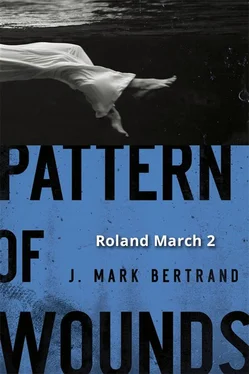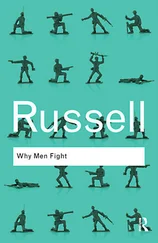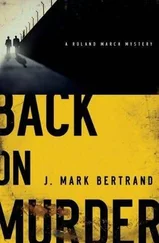J. Bertrand - Pattern of Wounds
Здесь есть возможность читать онлайн «J. Bertrand - Pattern of Wounds» весь текст электронной книги совершенно бесплатно (целиком полную версию без сокращений). В некоторых случаях можно слушать аудио, скачать через торрент в формате fb2 и присутствует краткое содержание. Год выпуска: 0101, Издательство: Baker Publishing Group, Жанр: Полицейский детектив, на английском языке. Описание произведения, (предисловие) а так же отзывы посетителей доступны на портале библиотеки ЛибКат.
- Название:Pattern of Wounds
- Автор:
- Издательство:Baker Publishing Group
- Жанр:
- Год:0101
- ISBN:нет данных
- Рейтинг книги:3 / 5. Голосов: 1
-
Избранное:Добавить в избранное
- Отзывы:
-
Ваша оценка:
- 60
- 1
- 2
- 3
- 4
- 5
Pattern of Wounds: краткое содержание, описание и аннотация
Предлагаем к чтению аннотацию, описание, краткое содержание или предисловие (зависит от того, что написал сам автор книги «Pattern of Wounds»). Если вы не нашли необходимую информацию о книге — напишите в комментариях, мы постараемся отыскать её.
Pattern of Wounds — читать онлайн бесплатно полную книгу (весь текст) целиком
Ниже представлен текст книги, разбитый по страницам. Система сохранения места последней прочитанной страницы, позволяет с удобством читать онлайн бесплатно книгу «Pattern of Wounds», без необходимости каждый раз заново искать на чём Вы остановились. Поставьте закладку, и сможете в любой момент перейти на страницу, на которой закончили чтение.
Интервал:
Закладка:
“So you think there’s nothing to it at all?” he asks. “The district attorney isn’t so sure. And frankly I’m not, either. There could be something to this, even if the Walker case doesn’t connect. I want you to take a look at the cases-”
“Even if? ”
“Don’t hassle me on this, March. I’m trying to help.”
“You’ve got a funny way of doing it.”
“You know something, you are one piece of work. Some of us have been doing this longer than you, March, and maybe you should listen for a change.” He throws his hands up in mock surrender and turns to go. “All I’m saying is, if you’re determined to dig your own grave, it’s only gotta be six feet down. You can stop shoveling anytime.”
Over dinner, Charlotte listens as I run my mouth, decompressing after a day of insanity. The conference with the district attorney piques her interest, and she asks a lot of questions about who was in the room, which for the most part I can’t answer. She even sits through my lecture on the problem with hyping the work of serial killers, the way it can blind ordinarily solid cops to the more mundane and far more likely explanations. It’s a good lecture, well rehearsed, and she does everything but applaud at the end.
I’ve worked three legit serial killer cases in the ten years I’ve been on murder. I’ve seen plenty more shoehorned into the mold, usually by young and inexperienced investigators who think that when a bona fide serial killer wields the instrument, death has more meaning than it otherwise would.
“You take so much of this to heart,” Charlotte says, running her fingers through my hair. “This will sound stupid, I’m sure, but it’s almost like you-all of you, the police, I mean-it’s like you’re the victims, too. The things you have to deal with, the things you have to witness.”
“Victim isn’t the word,” I say.
“That’s why I could never have practiced criminal law. When you get that close to the darkness, even if you’re there for the right reasons, it can’t help but affect you, can it?”
“It hasn’t affected me.”
She laughs. “No, of course not.”
“Other people can see what I see and call it what it is, but then they get to move on. They’re not expected to do anything. The difference is, I am.”
“Sometimes there’s nothing you can do, either.”
“Sometimes,” I say.
After dinner she puts a rental movie in the player, a romantic comedy, and after half an hour I wander into my home office, flipping up the laptop screen. I can’t remember the address Templeton entered to pull up my cousin’s website, so I type in a few search terms until the right link pops up. Although I’ve known of the site’s existence for a while, this is the first time I’ve actually gotten up the nerve to visit.
As the page loads I start to feel queasy, the way I always do when it comes to her: the Tammy Effect. With such a close-knit family, Charlotte has never understood the networks of estrangement in the March clan. My father, a widower in his early sixties, took up with his thirty-two-year-old secretary much to the consternation of his adult children, who only discovered the liaison when the secretary, my mother, turned up pregnant on my uncle’s doorstep. I call him my uncle, but in fact he was my brother, which makes my cousins actually my nieces and nephews, but the relations were reclassified for public consumption and I’ve grown so accustomed to them I can’t change.
It was left to my brother/uncle to sort out the mess. There was no question of my parents marrying. Neither of them was particularly keen on my arrival. In fact, if I’d been born a decade later, I probably wouldn’t have been born at all. So my uncle took me, raising me alongside his five-year-old son, Moody. Tammy was nine, and in just a few years became our de facto baby-sitter when her mother got a job as a secretary, despite the choice words my aunt had for working women whenever the topic of my own mother came up.
A disapproving Presbyterian whose elegant outward appearance concealed a jumble of superstitions and prejudices, though not very well, my aunt drove us like cattle to church each week, making it clear that of us all, I was the one most in need of cleansing. She would catch me out at awkward moments, firing off questions from the catechism.
What is the chief end of man?
To glorify God and. . something.
Man’s chief end is to glorify God, and to enjoy him forever, she’d say, adding a swat sometimes to aid the memory. Because she was beautiful, and because making impossible sacrifices for the children in her care was part of her marrow, I grew up wanting to please this woman and never feeling like I had succeeded. Noting this, my uncle took a special interest in me.
All this talk about chiefs and their ends, he would say. What about the braves and their ends? This is the land of the brave, ain’t it?
Who are the braves?
You and me, he’d say. We’re the braves. The ones put on this earth to get the job done.
What job?
But he’d just smile. I knew the job he meant, though, because he had a gun and a badge. Later on, after retiring on disability, he would hobble on his cane between the glass cases full of revolvers and automatics, holding court among the band of brothers he’d served alongside, who uniformly held him in esteem. At least they did when I was there.
Her website includes a page dedicated to Daddy, as she calls him, with a photo of him in uniform and a much later one taken in the gun shop not long before he sold it, when he’d traded in his cane for a wheelchair. There’s a juvenile poem, awkward in meter and rhyme, apparently written by Tammy herself, followed by the text of my uncle’s obituary. At the bottom of the column, his headstone at the cemetery, decked with fresh flowers. According to the caption: A GRAVESTONE FOR DADDY, BUT NO MARKER TO REMEMBER HIS SON.
There’s no tribute to her mother that I can find.
Tammy inherited all of her mother’s bad qualities and none of the good. No, that’s not fair. If I put on my psychoanalyst’s hat, it’s not so hard to come up with the formula that creates someone like her. Starved of attention, either through neglect or because she craved so much of it, Tammy found ways of standing out.
When I was in first grade, for example, she fed me laxatives wrapped in foil like chocolate, then skipped a day of school to take care of me during my “sickness.” Then there was the time a few years later when she sent Moody and me on a trek through the neighborhood after school, then called her mother at work to say we’d both run away from home. She didn’t do this to get us into trouble; she just wanted to be the focal point of the crisis. But often her plans had a way of producing unintended results, which often included an appointment with my uncle’s belt-for me and Moody, not for her.
It’s strange to think that the boy she did so much to torment early on is now her cause in life. Though of course Moody isn’t the cause, only the means to an end. Once again she’s using him to get attention.
When Moody disappeared in 1973, I was just eleven and he was fifteen, about to turn sixteen. Tammy had graduated high school and shown no interest either in college or getting a job. Her presence in the house kept me and Moody on the streets after school, though by then we were not often together. Tired of his prepubescent shadow, Moody had taken advantage of his new ten-speed to leave me in the dust.
The afternoon it happened, I came home to find Tammy alone on the couch watching television. My aunt drove my uncle home, arriving just before six, and there was an argument over who was supposed to set the table. When Moody missed dinner, my aunt fretted some, but it wasn’t the first time. At nine, my uncle told me to go to bed. From behind my door I could hear the three of them talking, my aunt accusatory and Tammy shrill and defensive, my uncle trying to calm them both down. He made calls to the parents of some of Moody’s friends-though of course he didn’t know the identities of Moody’s real friends-and then took my aunt out in the car to search, leaving Tammy with me.
Читать дальшеИнтервал:
Закладка:
Похожие книги на «Pattern of Wounds»
Представляем Вашему вниманию похожие книги на «Pattern of Wounds» списком для выбора. Мы отобрали схожую по названию и смыслу литературу в надежде предоставить читателям больше вариантов отыскать новые, интересные, ещё непрочитанные произведения.
Обсуждение, отзывы о книге «Pattern of Wounds» и просто собственные мнения читателей. Оставьте ваши комментарии, напишите, что Вы думаете о произведении, его смысле или главных героях. Укажите что конкретно понравилось, а что нет, и почему Вы так считаете.












